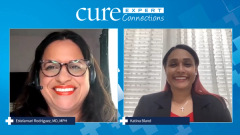
Access to Novel Therapy for EGFR Exon 20–Positive NSCLC
A brief discussion on the importance of accessing novel therapy and clinical trials in the setting of EGFR exon 20 insertion–positive NSCLC.
Episodes in this series

Transcript:
Estelamari Rodriguez, M.D., MPH: Let’s talk a bit about those new treatments. One thing that I share with people is that not a lot was happening during the COVID-19 pandemic. However, in those two years that we were at home and working from home, the FDA was very busy looking at all the data and the research that has been done in some of these new drugs. We have drugs for EGFR exon 20 insertion available today, approved by the FDA, that were not available before COVID-19. It goes to show people that this science is moving really quickly.
Katina Bland: It really is.
Estelamari Rodriguez, M.D., MPH: I don’t know if your husband was prescribed one of these drugs when he was treated.
Katina Bland: He was. One of my roles in the Exon 20 Group is the representative to the FDA. I had the distinct privilege of being on quite a few of the calls working in collaboration with our partners at the FDA on the idea of decentralization and expanded access for patients to use and get access to some of these drugs through clinical trials. That was huge for us in our battle with getting a hold of drugs and just being able to battle with my husband. One of the things I want to draw attention to is the most typical treatment for an exon 20 patient after they’ve had their first line of chemotherapy doublet, they can go into either one of the treatment drugs: amivantamab or mobocertinib. They can certainly choose even after that to pursue a clinical trial. My husband was the beneficiary of a drug called poziotinib, and he gained access to that drug through expanded access. It was incredible working alongside the clinicians, pharmaceutical companies, as well as our FDA partners to help us to facilitate that. According to the director of the Exon 20 Group, Marcia Horn, J.D., we got poziotinib in record turnaround time, from the time we began to pursue getting access to the drug to it arriving immediately at my husband’s bedside. That partnership was really important.
Estelamari Rodriguez, M.D., MPH: Thanks for sharing that because right now, we have the FDA-approved drugs, which I’ll go into detail about, but there are other drugs that are not yet FDA approved and they have been presented at national conferences. What you described is true, that we have the capacity of asking either for drugs in an expanded access or a compassionate protocol, so that if the drug is out, we should exhaust all those options. Today we have drugs that are approved, which makes things simpler. Once you identify these mutations, you can write a prescription. We don’t have to do the paperwork, although I’m glad to hear that it was relatively easy for you and your husband.
Transcript edited for clarity.





